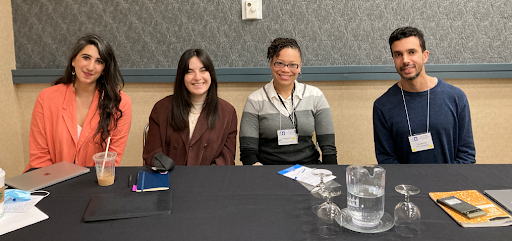Sociology faculty Rena Zito, Raj Ghoshal and Alexis Franzese presented research at the annual meeting of the Southern Sociological Society from March 29 through April 1 in Myrtle Beach, S.C.
Several faculty members in the Sociology and Anthropology Department presented research at the annual Southern Sociological Society conference in Myrtle Beach, South Carolina, from March 29 through April 1.
Rena Zito, associate professor of sociology at Elon University, presented the results of a survey-based experiment examining the impact of offense type and applicant race on university students’ attitudes towards university applicants with felony records. Zito co-authored the research with Stacy De Coster, professor of sociology at North Carolina State University.
The study demonstrates how offense characteristics and respondent political attitudes, concerns about campus crime, and legal cynicism shape perceptions of applicants with criminal records as threats to be managed or restricted. The research builds on an emerging body of experimental research on the barriers to upward social mobility through education for groups already experiencing extreme marginalization. The presentation was part of a session titled “Does the Punishment Fit the Crime? Racial Attitudes towards Crime & Punishment,” for which Zito was the presider.
Associate Professor of Sociology Raj Ghoshal organized and presided for a panel on Racial Conceptualization. He also presented in this panel. Since “race” has no fixed essence, racial conceptualization is the study of what people believe race consists of and how they think about its meanings. Ghoshal’s talk presented findings from a survey of American adults.
His analysis showed that most Americans think of race not just in terms of categories (White, Black, Asian, etc.) but also often conceptualize race as a set of spectrums, wherein people are thought of as belonging to categories to varying degrees. He also found that respondents’ age, gender, race and political ideology influence how much they think of race as a series of spectrums rather than solely as binary in/out categories. He argued that recognizing that people use multiple lenses to conceptualize race can improve anti-discrimination efforts.
 Associate Professor of Sociology Alexis Franzese and research mentee Brad Weiss ’23 presented their research, “Assessing a Theoretical Model about Motivations for Change within College Student Memoirs,” which investigated the applications of a sociological theory about how people make the decision for self-change through content analysis of several memoirs of college students about their transitions to campus life. The model studied put forth by Kiecolt (1994), suggests that decision for change occurs through four stages; the impetus to change, conditioning factors, a critical event, and finally appraisal. Preliminary results indicate support for Kiecolt’s model, and suggest the great degree to which the environment that one chooses can support (or inhibit) the transformation one may undergo. Their work provides important insights into understanding processes of self-change and of the college experience specifically.
Associate Professor of Sociology Alexis Franzese and research mentee Brad Weiss ’23 presented their research, “Assessing a Theoretical Model about Motivations for Change within College Student Memoirs,” which investigated the applications of a sociological theory about how people make the decision for self-change through content analysis of several memoirs of college students about their transitions to campus life. The model studied put forth by Kiecolt (1994), suggests that decision for change occurs through four stages; the impetus to change, conditioning factors, a critical event, and finally appraisal. Preliminary results indicate support for Kiecolt’s model, and suggest the great degree to which the environment that one chooses can support (or inhibit) the transformation one may undergo. Their work provides important insights into understanding processes of self-change and of the college experience specifically.


